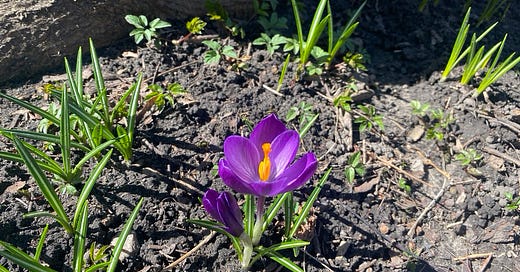I don’t know that I’ve ever written out why, exactly, my wife and I left Seattle for Detroit in 2022 after nine years in the Pacific Northwest. This seems as good a time as any to explain that, for reasons that will be made clear shortly.
None of this is meant to be a comparative exercise between the two places. I won’t pretend that I was glad to show Seattle my backside or that living in Detroit is everything I ever wanted. I’ve lost a lot, moving here: the company of some of the best friends I’ll ever have in any city or lifetime, a steady union job, and the mountains—my god, the mountains. Some days I miss them so much my heart feels like it’s become a black hole in my chest. I really took for granted in those days that at the drop of a hat I could drive an hour or two to some of the most beautiful places this country has to offer, for nothing but the cost of gas and my inevitable return stop at Twede’s, aka the Double R Diner of Twin Peaks fame. And Detroit isn’t always easy to love. You have to drive everywhere and the green space is limited and it’s as flat as a board.1
In the background, there were a lot of factors that drove us here: the cost of living and the unlikelihood of ever affording a home in Seattle, the distance from our families, the missed holidays and birthdays, and so on. But the main thing that brought us to Michigan was the possibility of trying to do something fundamentally different with our lives. What I mean is this: about two weeks after I moved to Seattle in 2013, I met, through one of those cosmic collisions of circumstance, a new friend who hailed from Michigan. I don’t think it happened in that first conversation, but very shortly afterward he shared with me the vision he had for his future, one in which he and all his friends moved to (or back to) Detroit to live cooperatively, owning houses and land together, sharing meals and gardens, really crossing that line between “being friends” and “being in community.”
I scoffed at that, at the time. I was 22 and in a new city, the greenness and beauty of which had enchanted me.
Well, here we are, more than a decade later. Trey, the friend in question, returned to Detroit in 2020, and that made my wife and I start thinking hard about the shape we wanted our adult lives to take. It took two years of phone calls and Zoom meetings with Trey and his partner Gina, but eventually we were sold. The prospect of living a life that extended beyond a single-unit, nuclear family—of living as part of a community, in all its messiness—was too great to pass up.
We’re still working on executing that vision, at least as far as home and land ownership goes. (Perhaps unsurprisingly it has taken some work to explain this vision to realtors and lenders without sounding insane.) But the important part, for now, is that a few times a week, we get to break bread together, drink together, play cards and frisbee and pickleball, watch each others’ pets, you name it. Not just the four of us, but the rapidly expanding group of people we know and care about in our neighborhood. In an emergency there are a dozen people I could call who could be at my door in two minutes or less. That’s a really special feeling, even at this very early stage of trying to work through what a lifelong community looks like.
I bring all this up because of a recent variant on a discussion that seems to resurface online every few weeks: namely, the ethics of app-based food delivery. The comments from the person in yellow, below, are what led to this whole train of thought for me.
It’s not that I’m unsympathetic to what Yellow is saying here. Groceries are getting mind-bogglingly expensive, and wasting food that you paid a lot of money for sucks. Meal planning is one of my least favorite chores; I’m as impulsive and reward-seeking as the next guy, and I could happily eat takeout most days without ever getting bored of it.2
What struck me most about Yellow’s comments is that nowhere in that worldview is there room for other people. The grocery math is about him and him alone. The idea of sharing food, sharing the planning and prep, swapping meals with a neighbor or inviting a friend over for breakfast to use up that extra bacon…that’s not in the calculation.
This is not Yellow’s fault, really: in the last 80 years the share of American households containing just one person has more than tripled, from 7.7% to nearly 30%. Every force in our lives as Americans is driving us further and further from each other, from the cost of child-raising to the precarity of work to the dismantling of public institutions as they’re sold off to private capitalist interests. The neoliberal turn has been the most successful political project in this nation’s history, and it’s making us all suspicious of each other and of the notion of any sort of common good.
But something not being your fault doesn’t mean that you don’t have a chance to fix it, or at least mitigate it. Our collective isolation and alienation from each other are structural problems, ones that won’t be solved in any real sense without a fundamental reorganization of society. You have to try anyway. I’m sorry, but you have to. You won’t solve it on your own, but you’ll be miserable otherwise. We are social animals and we are meant to be together: eating, laughing, singing, grieving, sharing, you name it. We’re hardwired for this and you are not special enough to overcome this need and curate a perfectly individual life for yourself. In surrender to this idea is the good news, the sweet relief: you don’t have to do it all alone. You can’t.
I’m not saying I have all the answers. You don’t have to abandon what you thought your life was and move across the country to do that. I mean, don’t take it off the table, though. Here I am proving that it can be done. But I do think everyone, for their own good and the good of others, should do some hard thinking about their day-to-day choices, and think about what other possibilities their lives might have if they gave themselves a chance to break this cycle. (I have been lucky in this regard: Trey and Gina, who convinced me to come to Michigan, have also taught me the joy of collaborative cooking, something I might never have tried on my own. I have wisdom and experience to share with the DoorDash crowd only because it was given to me by others—which just proves the point, doesn’t it?)
It’s not easy. Old habits die hard for a reason. I still frequently struggle with this, to be honest. Before the pandemic I would have characterized myself as an extrovert, someone who drew energy from interactions with others, who said yes to just about everything, who could stay out late and talk and talk. The first year of COVID gave me a chance for some course correction, to learn to live with and by myself in a way I had never done before. But with time, that course correction became an overcorrection, and it has led to a tendency in me to protect and preserve all my spare time, to look forward to weekend nights alone, to have my default response to social ideas become “Ehhh, I don’t know if I feel like it today.” It took my wife pointing out that I’d started feeling that way every day to make me realize I wasn’t walking the walk when it came to these ideas about what we owe each other, about what a community could be. We’re all tired, we’re all alienated, we’re all in desperate need of a break—but the answer to this, I’m learning, is more: more sharing, more time with others, more community. That feeling of constant exhaustion we all have here in 2024 is at least in part because it creates a feedback loop where we spend less time on and with others, which means less replenishment of ourselves, which means we spend less time on and with others, which means…you get it.
At my most optimistic I feel like other people are also beginning to realize this in ways big and small. I structure the classes I teach, for example, so that students have to work in groups to share their writing and their ideas, and so build trust with each other. Some days, when the phones are away and they’re all engaging with their peers and getting excited about their projects, I can feel a palpable sense of relief setting in. The joy of experiencing life the way we were always ought. On some level I think they understand that the isolating and distracting urges amplified by their phones are not good for them, that there’s another way to get through life. I hope I can help show them a different path.
This is all to say that I think, despite it all, that we still have within us the ability to reforge the bonds that the society into which we were dumped has done everything in its power to break. We can still fight for ourselves and for each other, and realize in the end that those fights are one and the same. That’s my hope, even if it’s a naive one. Roger Angell writes of cynicism, in “Agincourt and After,” that
[w]hat is left out of this calculation, it seems to me, is the business of caring - caring deeply and passionately, really caring - which is a capacity or an emotion that has almost gone out of our lives. And so it seems possible that we have come to a time when it no longer matters so much what the caring is about, how frail or foolish is the object of that concern, as long as the feeling itself can be saved. Naïveté…seems a small price to pay for such a gift."
Well, that’s good enough for me. A small price to pay, indeed.
Thanks, as always, for reading. I’ll talk to you next time.
-Chuck
PS - If you liked what you read here, why not subscribe and get this newsletter delivered to your inbox each week? It’s free and always will be, although there is a voluntary paid subscription option if you’d like to support Tabs Open that way.
Well, here’s one point of comparison anyway. People in Seattle drive badly in a way that mostly makes them a danger to themselves and their transmissions. People in Detroit drive badly in a way that makes them a danger to the entire human race.
I don’t, though. There are the obvious financial concerns; a meal on UberEats or DoorDash on average will run you 150% of what it would cost you to eat it at the restaurant. And then there are the ethical concerns: very little of that obscene profit makes it down to the delivery drivers themselves.








I met with a friend and he asked why we haven't hung out if we'd both been home, bored and unemployed, for months. Neither of us had a good reason. It was just easier not to.
I resonate so much with everything you've said here, Chuck. A large part of what I've grown to love about Baltimore is how neighborly the culture is. It's novel to be able to sit on our front porches and crack open some beverages during summer thunderstorms, or water each other's plants when someone goes out of town. Community is so important, and now you've got me thinking about other ways I can lean into it.
I wrote a sermon last fall about loneliness (at the request of a congregant) and one of the things I ended up exploring is how the mechanisms we use to emotionally survive periods of loneliness tend to become entrenched and self-protecting. I think a lot of us are trying to figure out how to shake off our pandemic habits in 2024, and so much of the success of this reorientation hinges on finding avenues of reconnection which feel authentic and accessible.